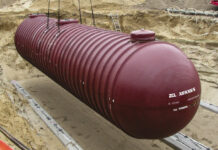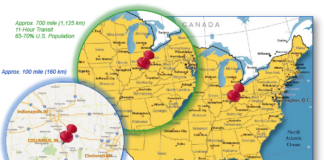
The Carolinas, well known for their creative climate and low-cost business environment, are now an East Coast engine for growth hitting on all cylinders. North Carolina and South Carolina are busy certifying shovel-ready sites and pioneering new incentives.
In South Carolina, the focus also is on creative workforce development strategies. The South Carolina Department of Commerce is committed to meeting a business’ specific workforce needs. The Department of Commerce’s Workforce Division and the readySC™ program, offered through the S.C. Technical College System, coordinate training needs at no cost for eligible new or expanding companies throughout the state. The readySC™ program works with the state’s 16 technical colleges to develop training curriculum tailored to meet a company’s workforce requirements. More than a quarter-million workers have been trained since the nationally recognized program’s inception.
South Carolina won Business Facilities’ 2009 Deal of the Year Award for N. Charleston’s selection as the location for Boeing’s second final assembly plant for the 787 Dreamliner commercial airplane.
Across the state line to the north, Gov. Bev Perdue recently established the North Carolina Innovation Council to foster strategic investments and policies in the growing knowledge and innovation economy. The North Carolina Innovation Council is part of Gov. Perdue’s JobsNOW initiative. Through JobsNOW, the state will work aggressively to create jobs, train and retrain its workforce, and lay the foundation for a sustainable economic future.
“To continue growing jobs in North Carolina, we must make sure this state is poised to compete globally in the 21st century,” says Perdue. “Innovation is North Carolina’s launch pad to success in the global economy, and it’s a primary way for us to maintain and sharpen our competitive edge.”
“Business leaders know we are listening to them and working aggressively to meet their needs,” Perdue says. “Companies know that in North Carolina they will find top-quality talent, world-class infrastructure, a pro-business environment and premier education institutions. North Carolina is simply a great place to do business.”
NC Public Power: Leading the Way to Economic Recovery
As business leaders around the world continue to scan the daily headlines for encouraging economic news, at least one is already seeing signs that the global crisis has finally run its course.
“We’ve seen a measurable uptick in interest and activity over the last year and a half,” said Brenda Daniels, economic development manager for ElectriCities, a not-for-profit government service organization representing North Carolina cities and towns that own electric distribution systems.
Daniels isn’t overly surprised to find her organization’s membership playing the role of leading economic indicator.
“Companies that come out of the gate fastest and strongest after a recession are typically those that are most focused on efficiency and cost control,” she said, speaking from ElectriCities headquarters in Raleigh. “Not coincidentally, efficiency and cost control are two areas in which we excel.”
Daniels explained that one of ElectriCities’ many roles is to represent member communities to expanding and relocating companies. Her staff maintains comprehensive databases for all 70+ public power municipalities in North Carolina.
As easily as flipping a switch, a site selection professional can order detailed reports on dozens of North Carolina sites, from mountains to coast. Within 48 hours of a request, ElectriCities will send profiles of locations that precisely match the company’s specifications.
Daniels emphasized that the process is “fast, efficient, and entirely confidential.” Using ElectriCities as an introduction to North Carolina, site search managers have a turnkey information source. “They find all the information they need in one place.” ElectriCities’ staff produces a full profile that details infrastructure, site availability (including site and building photos), labor and even lifestyle data such as schools, hospitals and golf courses.
ElectriCities remains a partner through the entire process, helping companies with utility related issues, arranging site visits, and facilitating contact with local, county and state officials.
There’s another key factor that’s making the phones ring at ElectriCities: the availability, reliability and affordability of North Carolina public power.
“It’s no coincidence that some of the state’s most dynamic growth has occurred in our public power communities,” said Daniels. “Advanced manufacturing, food processing, metal-working, plastics—any power-intensive industry is going to find significant advantages here.”
Companies based in ElectriCities member communities recognize the cost efficiencies and superior customer service public power provides. Municipal utilities don’t have to pay dividends to shareholders, and those savings can be passed on to the utilities’ customers. Both ElectriCities and the member utilities work closely with companies to help them manage their power usage and keep costs down.
Businesses are also happy to have the personal touch public power provides. “Customers always tell us, we’d much rather work with you. We can call somebody, we can get an answer,” said Larry Cranford, electric department director in Statesville, an ElectriCities member community. “That doesn’t happen with other power providers.”
Daniels believes the optimism she sees is also driven by North Carolina itself, which is renowned for its pro-business climate, excellent job training programs, and low labor costs. “People just expect North Carolina to bounce back faster and stronger than other places.”
She cited the examples of Lubrimetal Corp, which will locate in Granite Falls creating 19 jobs and investing $1.9 million. Also Freightliner/Daimler Trucks in Gastonia will expand with 100 new jobs. “The recent decisions of these companies to locate and expand here shows a lot of confidence in North Carolina and our public power communities.”
North Carolina is perhaps the only state that’s perennially ranked among both the best states for business AND the best places to live. People and companies alike are drawn to the Tar Heel State’s outstanding universities, its beaches and its Blue Ridge Mountains, the low cost of living and doing business, and its temperate four-season climate.
To learn more, call Brenda Daniels at ElectriCities toll-free 1-800-768-7697 est. 6363 or mobile 919-218-7027; email bdaniels@electricities.org; or visit www.electricities.com.
Workforce Quality: The Key To Growth In Winston-Salem
Winston-Salem, NC keeps popping up in conversations among site consultants, economic development professionals and, most importantly, business leaders looking to expand or relocate their operations. And for good reason.
In particular, Winston-Salem has become a prime spot for several key industries: life sciences and health care; advanced manufacturing; financial services; and a growing presence in logistics and data centers. Why? Location helps, along with a robust infrastructure. However, it is the overall combination of several unique qualities and attributes that gets us into the game.
The way community and business leader, educational institutions, city and county government organizations all work together is a true difference maker in creating an ideal, pro-business climate in Winston-Salem. This ability to easily collaborate allows area leadership to both serve the community’s best interests and nurture business development.
The latest example of the community’s collaborative spirit is Wake Forest Biotech Place, a state-of-the-art multipurpose biotechnology research and innovation center. The new research facility is a world-class 242,000-square-foot redeveloped historic structure. This modern biotech research laboratory opened in early 2012 and is where internationally recognized researchers are pioneering new fields of medicine. However, the redevelopment of the property was only possible through close collaboration among Wake Forest Baptist Health, Piedmont Triad Research Park, Wexford Science & Technology, government, community and business leaders.
As every economic development professional knows, getting these community “planets” to align anywhere is, at best, difficult. The fact that Winston-Salem does it on a consistent basis is downright extraordinary. The combination of available workforce and advanced education programs puts Winston-Salem on many companies’ short lists for expansion and relocation. The training programs being developed by Forsyth Technical Community College have even attracted the attention of the last two Presidents of the Unites States, with both dropping by for visits during their respective terms.
A prime example is Caterpillar’s decision to build an advanced manufacturing facility here in Winston-Salem. Workforce availability, customizable training and education capabilities, coupled with an ideal site and sensible business incentives, all combined to make the decision an easy one for Caterpillar management.
Winston-Salem comes by its creative culture honestly. Dating back to its origin as a Moravian settlement, the city has always placed a high value on the arts. Through the early 20th century, that creativity led to innovation in manufacturing that transformed the area into a booming industrial center. The resulting prosperity brought with it the development of new avenues for creativity, such as the founding of the first Arts Council in the nation in Winston-Salem.
Today, examples of Winston-Salem’s culture of creativity can be seen throughout the community—along the Arts District on Trade Street, in the galleries of the numerous art museums, at performances of the UNC School of the Arts, Milton Rhodes Fine Arts Center, Winston-Salem Symphony and other organizations. The most striking effects of this culture of creativity, however, reach well beyond the art world. The area’s long-standing emphasis on creativity has spawned innovations in life sciences, nanotechnology and advanced manufacturing.
Consider the well-publicized advances of the Wake Forest Institute for Regenerative Medicine, for instance, where scientific discovery meets real world clinical applications. The groundbreaking research teams at the institute created the world’s first laboratory-engineered organ—bladder tissue that has been successfully implanted in children and adults—and are working to engineer more than 20 different organs and tissues. Breakthroughs like these happen not by accident, but when the right people and resources come together in an environment that encourages expression and creativity. And it is no accident that the institute anchors one corner of Piedmont Triad Research Park, Downtown Winston-Salem’s urban research campus.
On their own, each of the qualities we’ve described makes a huge difference in Winston-Salem’s success. And, depending on the industry, one of the attributes may provide the tipping point for the city getting chosen for a business’s expansion or relocation plans. Together, though, collaboration, workforce quality and innovation make Winston-Salem stand out as a place where businesses thrive. For more information on Winston-Salem, visit www.wsbusinessinc.com or contact Winston-Salem Business, Inc., at 336-723-8955.
Oconee County Is Reinventing Itself
Oconee County is no longer Upstate South Carolina’s best kept secret. The message of a business climate built for success is spreading thanks to being home to Fortune 500 Companies such as Duke Energy Corporation, Johnson Controls, Inc., Sandvik, US Engine Valve, Schneider Electric and BorgWarner Automotive. Steeped in history and tradition, Oconee County is home to natural beauty, a low cost of living, a pro-business atmosphere and unparalleled access to the United States.
Not many communities can match the wonderful climate in the beautiful foothills of the Blue Ridge Mountains with which Oconee County is blessed. The area also has world class lakes—Hartwell, Jocassee and Keowee and premiere rivers—Chattooga, Keowee and Chauga so there is plenty to do from an outdoor sports perspective.
Along with the abundant recreational choices, there are plenty of opportunities to enjoy the culture and fine arts of the communities. Thanks to close neighbors Clemson University, the cities of Greenville and Anderson even more entertainment is available. If quality of life is a driving factor for a personal or business choice, then look no further.
South Carolina is a mere two days’ drive from nearly 208 million Americans—a whopping two-thirds of the United States population. Oconee County is well-positioned midway between Atlanta and Charlotte. Market access along the Interstate 85 Corridor is one of the strengths Oconee has to offer. Whether it is an expansion opportunity or relocation decision, Oconee County has a proven record that it possesses a competitive advantage when it comes to the right location.
Many in the business and economic development community have found that the State of South Carolina has a top-ranked business climate. The cost of living is about 10 percent lower than the national average and there is a solid foundation for business growth due to low taxation.
In addition to the pro-business environment, companies come to South Carolina for its ready-trained workforce––ranked No. 6 in the country by CNBC. The state’s northwestern-most county offers companies a workforce that is trained with a strong work ethic. The remnants of the textile age have instilled in the people a knack for being hard-working and dependable. With new career choices emerging, a partnership with the local technical school has proven valuable in getting the Oconee County workforce of tomorrow ready today.
When you take that fact and combine it with location, you will understand why Oconee County is coming off one of its’ best years for economic development announcements. BASF recently made the decision to invest $60 million dollars in expanding their operations at the Seneca, SC plant. BorgWarner Torqtransfer Systems, Inc. continues to invest in Oconee County having completed a$25 million dollar expansion this spring.
These recent successes have helped to usher in a new outlook towards economic development from the County perspective with investment in a speculative shell building to entice new business and new opportunities for job creation. Oconee County is also in the process of developing two new industrial parks, one on SC Highway 11 and the other along Interstate 85.
Oconee County is in a period of profound transformation and has a powerful opportunity to reinvent itself. As the global economy continues to improve, the county will be in position to meet the demands of the future. To learn more about South Carolina’s western-most county and the opportunities it boasts, visit www.oconeeSCedc.
NC Electric Cooperative: Providing Statewide Service
North Carolina’s electric cooperatives serve more than 2.5 million people across North Carolina in 93 of the state’s 100 counties. The 26 electric cooperatives are private, independent and not-for-profit entities committed to providing a high standard of service to residential, commercial, industrial and agricultural customers with at-cost electric service. Each of North Carolina’s electric cooperatives is governed by a board of directors elected from its membership. Members are also owners. North Carolina’s electric cooperatives emphasize the importance of community involvement, integrity, accountability and innovation.

Since 1995, North Carolina’s electric cooperatives have helped bring more than 14,600 jobs and $903 million of economic investment to the state.
When North Carolina farmers and their neighbors formed cooperatives in the 1930s and 1940s to supply themselves with electric power, they intended to improve more than the quality of their lives and work. They also knew they were contributing to the development of their communities.
Since then, this network of electric cooperatives has become a major force in North Carolina’s economy. Cooperatives are not-for-profit corporations owned by members—the people and businesses they serve. Members democratically elect their cooperative’s board of directors, who set policy and supervise the operations of the business. Revenue that is not required for general operations, infrastructure and system stability is returned to members in the form of capital credits or member dividends. In North Carolina in the 1930s and 1940s, local citizens organized cooperatives to provide safe, reliable and affordable electric power to homes and businesses that other utilities were unable to serve.
North Carolina’s network of 27 electric cooperatives serves nearly 30 percent of the state’s population, some 2.4 million people, with more than 860,000 accounts. Our power distribution territory covers approximately 23,800 square miles, nearly half the state’s land area, in 93 of the state’s 100 counties.
In 1949, we formed a statewide cooperative to acquire and supply wholesale electrical power to cooperatives collectively. The North Carolina Electric Membership Corporation (NCEMC) today helps to meet the power requirements of 26 of the state’s 27 cooperatives. NCEMC owns a 56.25 percent share of the Catawba Nuclear Station in York, S.C., one of the most efficient nuclear generating facilities in the nation. NCEMC also owns two diesel-powered generators that provide peak-load and emergency power to the Outer Banks.
Today, the total assets of the cooperatives combined is more than $5 billion.
Nationwide, 864 electric cooperatives serve more than 39 million members in 47 states. North Carolina’s electric cooperatives also are part of the 600-plus electric co-ops who have chosen to join Touchstone Energy, a nationwide coalition of cooperatives who pledge to adhere to our core values of integrity, innovation, accountability, and commitment to community.
Besides providing reliable electric power to members and their communities, North Carolina’s Touchstone Energy cooperatives have been heavily involved in overall regional economic development. Activities range from small business assistance to establishing industrial parks, from encouraging local educational and health care initiatives to supporting non-profit social services and neighbors in need.
The direct impact includes providing local employment, investing in our systems and staffs (which involves day-to-day commerce with other businesses and families), returning capital credits dividends to members, and direct funding of local and regional economic development projects. Each dollar that cooperatives spend, of course, is multiplied in its effect as those dollars make their way through the economy, spurring further productivity, income, employment and investment. Direct financial support from the state’s electric cooperatives is conveyed to business development, education, civic and community projects, and energy-efficiency and housing.
About 55 percent of cooperatives’ direct community spending supports local industrial and business development, that provides employment and creates goods and services. Programs include low interest loans and business opportunity grants, including the zero-interest Rural Economic Development Loans available through the U.S. Dept. of Agriculture.















![[VIDEO] Get More for Your Business in Ardmore. Oklahoma](https://businessfacilities.com/wp-content/uploads/2024/02/maxresdefault-324x160.jpg)
